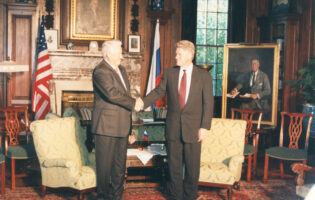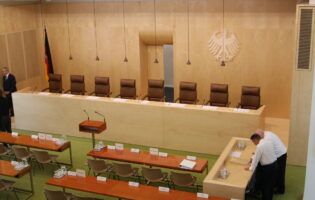The Impact of Reconciliation Initiatives: Two German Case Studies
On September 24, 2013, AGI hosted a discussion on “The Impact of Reconciliation Initiatives: Two German Case Studies” with Dr. Romain Faure and Ms. Lina Nikou, both Harry & Helen Gray Reconciliation Fellows at AGI. They presented two different reconciliation initiatives that Germany has implemented on an international level on the one hand and on a local level on the other hand: textbook diplomacy, which aims at changing the content of history textbooks, and the issuing of invitation to members of the former Jewish citizens of Germany to visit the towns from which they were exiled. These efforts might in part be the reason for noting Germany as a role model in terms of reconciliation, and why other countries are looking to Germany for lessons.
Textbook diplomacy generally refers to re-assessing textbook content and attempting to reflect the facts more accurately. One can map five main positive effects of textbook diplomacy: changes in textbooks, empowering textbook authors to address difficult topics, increased public debate on shared history, setting new standards for textbooks, and overcoming simplistic pattern of perpetrators versus victims. However, there have also been some negative effects of textbook diplomacy, namely the nationalization of historiographical positions, perspective of dialogue, and what German scholars call “Versöhnungskitsch,” which occurs when the history of a bilateral relation is artificially sugarcoated. Overall, textbook diplomacy proved to be influential in the reconciliatory efforts, because of these different effects, which are rarely taken into consideration as a whole.
The invitation programs in Germany began in Munich in 1961, and have since spread throughout the country. Berlin, in part due to its historically large Jewish community, has sent out the most invitations, and also covers travelling and accommodation expenses. In these programs, local city governments offer Jews who were deported or left the country as a result of the Nazi regime the opportunity to return to their cities of origin, oftentimes with great fanfare. However, the experiences of the participants were marked with mixed results, some displaying ambiguous feelings or discomfort at returning to Germany. Although thank you letters expressed their gratitude at receiving the invitation and trip, some visiting Jews had difficulties visiting the places where their family members had suffered. Even though the programs were generally welcomed in the German-Jewish emigrant community and also helped improve Germany’s reputation, the program’s framework did not really allow the participants to express concerns about the country that had committed its atrocities and the impact that had on their lives.
Both textbook diplomacy and invitation programs have contributed to Germany’s successful reconciliation, and are in part responsible for the praise Germany receives of its reconciliation efforts. While similar initiatives are underway in other countries and regions searching for reconciliation, the universal applicability of these efforts is arguable, and reconciliatory initiatives remain country-specific, as their success is hard to predict.
| DATE: | Tuesday, September 24, 2013 |
| TIME: | 12:00pm – 2:00pm |
| LOCATION: | AGI |
| 1755 Massachusetts Avenue, NW, Suite 700 | |
| Washington, DC 20036 |







